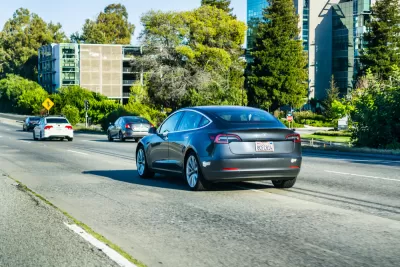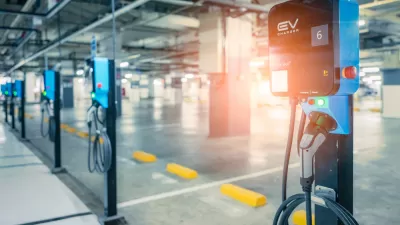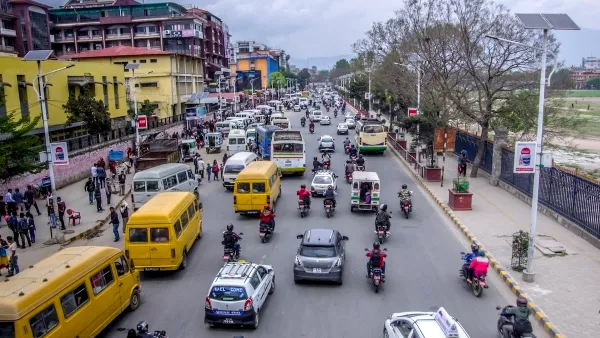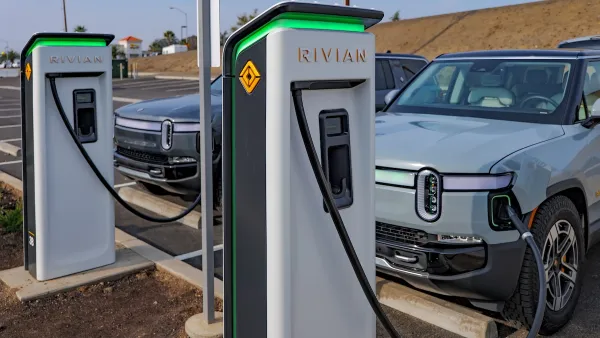Without incentivizing the actual use—rather than just the purchase—of electric vehicles, current EV tax credits could actually drive higher carbon emissions.

Kea Wilson reports on a new study that calls out U.S. electric vehicle incentives for contributing to higher carbon emissions. As the article states, “the wealthy people who are among the only ones able to take advantage of EV tax credits don’t drive their green cars enough to make up for the heavy emissions impact of manufacturing them in the first place,” causing current incentive programs to do more harm than good.
In a new paper published in Nature Sustainability, researchers modeled the lifetime emissions impact of the electric vehicles that more and more Americans are buying, thanks in part to federal and state tax credits.
More specifically, though, the researchers explored two often-overlooked factors that can have a seismic effect on how green an EV actually is: 1) whether it becomes a primary household vehicle, rather than a complement to a gas-powered one, and 2) how far it’s actually driven over its lifetime.
Today’s incentive programs, the study’s lead paper Dr. Ashley Nunes argues, subsidize the purchase—but not the use—of electric vehicles. “If you went out today and bought an EV, you’d still get to keep that subsidy, even if your EV sat in the garage for the better part of five years and you drove your [car with an internal combustion engine] every day instead. That’s not a good use of government capital.” Meanwhile, “Some automakers estimate that building an EV generates about 70 percent more emissions than comparable gas-powered cars, thanks to the carbon-intensive battery manufacturing process, though it more than makes up for it once it once the vehicle has clocked a certain number of zero-emitting miles.” Based on the model developed by Nunes, the average EV would make up those emissions with between 28,069 and 68,160 miles driven in its lifetime.
“Nunes says his research points to a need for major reforms, including restructuring incentive programs to make them available to second-hand buyers, switching to a federal tax rebate rather than a credit to open the program to lower-income Americans, and in some cases, strategically increasing charging capacity to encourage drivers to take the e-car rather than the clunker.” Nunes also calls for more investment in public transit and other means of getting people to drive less—whether in a gas-powered or electric car.
FULL STORY: Study: Today’s EV Tax Credits Might Actually Increase Emissions

Planetizen Federal Action Tracker
A weekly monitor of how Trump’s orders and actions are impacting planners and planning in America.

Chicago’s Ghost Rails
Just beneath the surface of the modern city lie the remnants of its expansive early 20th-century streetcar system.

San Antonio and Austin are Fusing Into one Massive Megaregion
The region spanning the two central Texas cities is growing fast, posing challenges for local infrastructure and water supplies.

Since Zion's Shuttles Went Electric “The Smog is Gone”
Visitors to Zion National Park can enjoy the canyon via the nation’s first fully electric park shuttle system.

Trump Distributing DOT Safety Funds at 1/10 Rate of Biden
Funds for Safe Streets and other transportation safety and equity programs are being held up by administrative reviews and conflicts with the Trump administration’s priorities.

German Cities Subsidize Taxis for Women Amid Wave of Violence
Free or low-cost taxi rides can help women navigate cities more safely, but critics say the programs don't address the root causes of violence against women.
Urban Design for Planners 1: Software Tools
This six-course series explores essential urban design concepts using open source software and equips planners with the tools they need to participate fully in the urban design process.
Planning for Universal Design
Learn the tools for implementing Universal Design in planning regulations.
planning NEXT
Appalachian Highlands Housing Partners
Mpact (founded as Rail~Volution)
City of Camden Redevelopment Agency
City of Astoria
City of Portland
City of Laramie





























